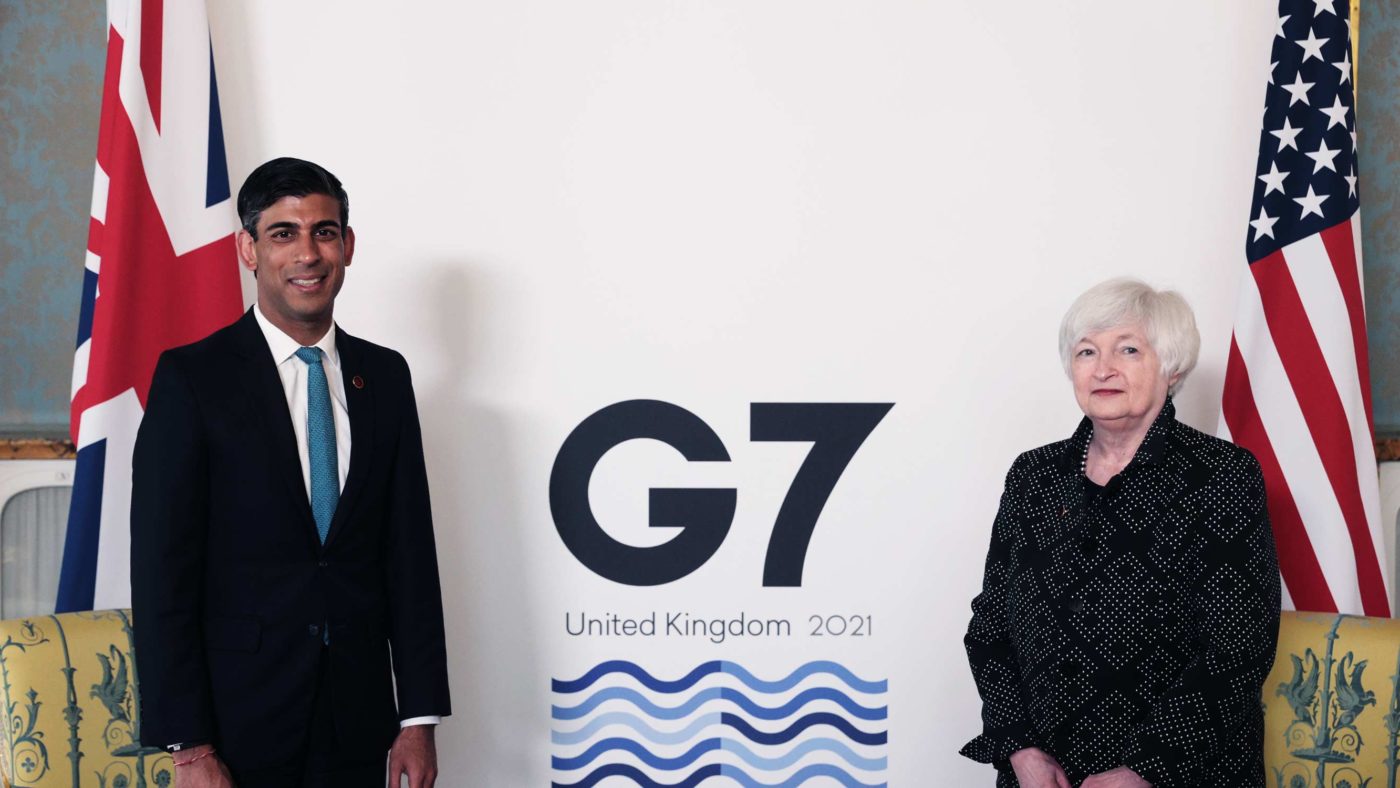According to Rishi Sunak, this weekend saw a “seismic tax reform”. His German counterpart, Olaf Schulz, agreed that this was a “historic” moment. After years of negotiations, the G7 has finally agreed to push for a worldwide minimum corporate tax of 15% – and to tax companies in the countries where they make a profit. Whether the G7’s agreement will actually lead to what Sunak calls “a fairer tax system fit for the 21st century” is another question altogether. In fact, there’s a real danger that these proposals will damage the prosperity of competitiveness of the world’s major economies, while trampling on nation states’ freedom and sovereignty.
The idea of a minimum corporation tax has been knocking around for quite some time, not least in the EU. The likes of France and Germany have long taken umbrage that smaller member states like Ireland and Luxembourg have used low corporate tax rates to entice companies to relocate. Rather than reconsider their own counterproductive policies, the EU’s two biggest economies have simply decided to try forcing everyone else to play by their rules.
It was, of course, precisely these kinds of top-down, one-size-fits-all plans implemented by an international bureaucracy that led Britain to leave the EU. That makes it all the more odd that, together with the Biden administration, the UK is now spearheading the effort to implement this kind of supranational policy.
Now, it is true that for the moment the proposals are rather weak. The plan agreed so far rests on two key elements: first, “the largest and most profitable multinationals will be required to pay tax in the countries where they operate”. This, however, is only the case for corporations with a profit margin over 10%, meaning a businesses such as AstraZeneca would be affected by it, but corporate behemoths like Amazon – so often the target of tax campaigners’ ire – would not. It’s a proposal that fails the basic rule of tax policy, that levies should be easy to understand, evenly applied and hard to avoid. The 10% threshold represents an open goal for the kind of savvy accountants employed by big firms, who are more than capable of shuffling a few columns about to minimise their clients’ tax bill.
The second pillar is a 15% global corporation tax. As it stands, 15% doesn’t sound too bad. After all, only a handful of countries – such as Ireland – fall under this threshold. It is clear, however, that this would only be first step. Indeed, straight after the agreement was announced, French finance minister Bruno Le Maire said it was only a “starting point” and that “in the coming months we will fight to ensure that this minimum corporate tax rate is as high as possible”. Perhaps even as high as France’s own tax of 28%? Or maybe have even more “ambition” and aim for Germany’s eye-watering 30%?
Needless to say, an international tax, corporate or otherwise, impinges on national sovereignty. It takes a country’s tax system out of the hands of local and national governments and into the hands of distant bureaucrats. Whether it’s the EU, the G7 or the OECD calling the shots, the principle remains the same.
It’s hard to avoid the conclusion that this is another bout of protectionism from countries such as Germany, France, and Italy which have long pursued counter-productive, draconian tax policies. The big difference now is that they have a willing ally in the shape of Joe Biden. As the Adam Smith Institute’s Morgan Schondelheimer noted here last week, there’s a word for this kind of behaviour. If businesses were following such a strategy instead of governments “we would call this a cartel”.
The competitive element in tax policy is incredibly important, however. Competition doesn’t only exist in markets; it also exists between states. Different governments may attempt different policies and through a trial-and-error-process, we discover what works and what doesn’t. That’s not a theoretical abstraction, but a lesson from history. It’s why the decentralised, competing states of Europe were the cradle of industrialisation, and not hyper-centralised, sclerotic China. It’s also one of the great advantages of the American system, whereby individual states offer a test bed for radical policy innovation, which others can then imitate or improve on.
To be clear, though, competition in tax policy does not necessarily mean a “race to the bottom”. Rather, it would lead to countries with sound tax policies doing better and reaping the rewards of good statesmanship. The winners might not be Ireland, but countries like Estonia or New Zealand. Bear in mind too that a good tax system is not just about low rates. High-tax Sweden does relatively well in the Tax Foundation’s International Tax Competitiveness Index because its system is logical, decentralised and fairly business-friendly.
Competition is also an important guarantor of freedom. In a globalised world, a country implementing punitive income taxes would soon see those affected up sticks to somewhere more hospitable. Likewise, whatever the policy, competition and decentralisation are safeguards against intrusive or irresponsible governments, while also producing the kind of trial-and-error that improves policy and enhances prosperity.
That’s why adopting the kind of one-size-fits-all approach favoured by the G7 would be so damaging. Its an assault not just on nations’ independence, but on the very concept of competition. Politicians harping on about a “level playing field” should realise they are levelling down, making everyone more mediocre in the process. It is just that kind of deadening, overmighty approach that Britain decided to leave by rejecting the EU. It would be a great pity if the Government now embraced it once more in a different guise.
Click here to subscribe to our daily briefing – the best pieces from CapX and across the web.
CapX depends on the generosity of its readers. If you value what we do, please consider making a donation.


